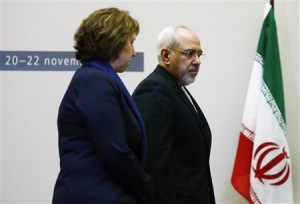A deal has been reached between six world powers and Iran that calls on Tehran to limit its nuclear activities in return for sanctions relief, the French and Iranian foreign ministers said early Sunday.
Iranian Foreign Minister Mohammad Javad Zarif said, “Yes, we have a deal,” as he walked past reporters crowding the hotel lobby where marathon negotiations had taken place over the past five days.
Asked if there was a deal, French Foreign Minister Laurent Fabius said “Yes” and gave a thumbs-up sign.
The goal had been to hammer out an agreement to freeze Iran’s nuclear program for six months, while offering the Iranians limited relief from crippling economic sanctions. If the interim deal holds, the parties will negotiate final-stage agreements to ensure Iran does not build nuclear weapons.
The White House announced that President Barack Obama would make a statement on the agreement shortly.
The deal came after the personal intervention by Secretary of State John Kerry and other foreign ministers whose presence had raised hopes for a breakthrough.
Diplomats refused to spell out details of the talks, which dragged on past midnight. As the meetings continued into Sunday, Iranian Deputy Foreign Minister Abbas Araghchi described the talks as being in “their 11th hour,” with most issues resolved but an agreement still elusive.
Consensus came after nearly a decade of inconclusive international efforts to halt Iran’s expanding nuclear program. Iran insists its program is for peaceful purposes and not aimed at building nuclear weapons.
The agreement built on the momentum of the historic dialogue opened during September’s annual U.N. gathering, which included a 15-minute phone conversation between Obama and Iran’s new president, Hassan Rouhani, after three decades of U.S.-Iranian estrangement.
For the U.S. and its five partners, the chief concern is uranium enrichment, which can be used to power nuclear reactors as well as serve as the fissile core of warheads.
The six — the United States, Russia, China, Britain, France and Germany — were seeking to halt expansion of Iran’s enrichment program, including an end to enriching to a level that can be turned into warhead material within weeks.
They were also looking to increase outside oversight of Tehran’s nuclear activities and find a way to ease concerns about a reactor that will produce plutonium when finished. Like enriched uranium, plutonium can arm warheads.
In return, the six powers were offering gradual and limited sanctions relief over six months, depending on Iran’s compliance. Core sanctions on oil exports and financial transactions — the most severe penalties — are to be kept in place until a final deal is achieved that permanently reduces proliferation dangers from Iran’s nuclear activities.
Obama
The agreement — described as an “initial, six-month” deal — includes “substantial limitations that will help prevent Iran from creating a nuclear weapon,” U.S. President Barack Obama said in a nationally televised address.
The deal, which capped days of marathon talks, addresses Iran’s ability to enrich uranium, what to do about its existing enriched uranium stockpiles, the number and potential of its centrifuges and Tehran’s “ability to produce weapons-grade plutonium using the Arak reactor,” according to a statement released by the White House.
Iran also agreed to provide “increased transparency and intrusive monitoring of its nuclear program,” it said.
ABC


Leave a Reply
You must be logged in to post a comment.